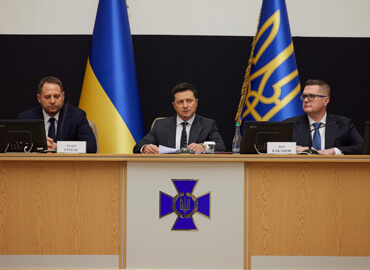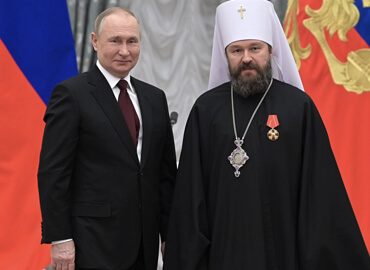State media continue to manipulate their coverage of the coronavirus pandemic. Earlier, they focused on the consequences of the coronavirus, stating that in Western countries and Ukraine the situation is catastrophic and chaotic, and that in Belarus, everything is «under control.» At the end of 2020, state television channels announced that Belarus had already supposedly tackled the epidemic and that foreign countries were following its example.
Since the beginning of the year, as vaccines have become more widely used, the content of reports on the topic of coronavirus has shifted towards vaccination. Below is a description of the main characteristics and contradictions of the state program in their coverage of vaccination.
Through the Looking Glass: Is the European Union Losing in the Vaccination of Russia and Belarus?
If you do not approach the BT stories critically when they are broadcasting about the «catastrophic» situation in Poland and Lithuania, the lack of vaccines in the European Union and the superiority of Russian vaccines over Western ones, you might get the impression that Belarus and Russia are confidently ahead of the EU states in the process of vaccinating the population. However, the reality is quite the opposite: the pace and scale of vaccination in the European Union is significantly ahead of Russia, let alone Belarus.
As of April 21, in most EU countries 20% to 30% of the population were vaccinated and in Malta it was more than 65%. This indicator did not reach 20% in only three EU countries – Bulgaria (9.7%), Latvia (12.2%), and Croatia (17.7%). In Russia, for comparison, 7.2% of the population had been vaccinated by this date; that is, less than in any other EU country.
In Belarus, according to the Ministry of Health, as of April 21, 211 thousand people received the first dose of the vaccine, which is slightly more than 2% of the population. That is, as of the end of April 2021, the scale of vaccination in Belarus was 4-5 times lower than the most lagging EU country in vaccination (Bulgaria), and 10-15 times lower than most EU countries.
In broadcasting about the difficult situation with the coronavirus in the European Union, Belarusian television stations pay special attention to the situation with the epidemic in neighboring Poland and Lithuania. «An acute shortage of places in clinics,» «a staggering figure,» «a catastrophic situation» – these statements are all about the course of the third wave of the epidemic in Poland. Within the same story they report on a by Lithuanian police who are defending their right to priority vaccination. In another story, Belarus Channel 1 showed a resident of Lithuania who said that in regions where Belarusian and Russian television is popular, many residents trust the Russian Sputnik V vaccine more, and some even hope to be vaccinated in Belarus.
Denigrating the Pfizer and AstraZeneca vaccines
State television channels cast aspersions on the effectiveness of Western vaccines, especially Pfizer-BioNTech and AstraZeneca. And this does not have to do with documented fatalities following their use. These incidents did happen and have been widely covered, including by Western media.
The problem is that Belarusian television channels avoid comprehensive coverage of the issue, including the conclusions of scientific studies that side effects are statistically extremely rare, and the benefits of vaccines outweigh the possible risks.
So, at the end of March, 79 cases of thrombosis and 19 deaths were reported among those vaccinated with the drug AstraZeneca, even though by that time 20 million injections of the drug had been recorded. A similar side effect occurred in 0.000395% of those vaccinated by AstraZeneca, of which 0.000095% of the vaccinated died.
This does not prevent BT from affixing unambiguously negative labels to the drug. As stated in one of their stories, since Poland is tightening restrictive measures, then, «apparently, the mass vaccination with the dubious drug AstraZeneca does not help our western neighbor.»
Here is an example of another statement designed to tarnish the reputation of Western vaccines and present Russian vaccines in a positive light: «Just in Austria after vaccination, 63 people died, and in Great Britain – 16. Europeans no longer trust this vaccine and it is no coincidence that Germany is preparing negotiations with Moscow on the purchase of the Russian vaccine.»
Pfizer-BioNTech’s U.S.-German vaccine also gets some criticism from time to time. From it, according to Belarus Channel 1, «patients simply die.» It was also reported that Lithuania «turned a blind eye» to the death of a pensioner from the Pfizer vaccine, but is at war with the Russian vaccine.
On the other hand, the acceptance of the Chinese vaccine by Belarusian television channels is described as excellent and BT also avoided reporting on a scandal with the supply of low-quality Russian vaccines to Slovakia.
The vaccine will no longer help Ukraine
Many BT stories criticize the state of vaccination in Ukraine, even though Belarus itself cannot yet boast of a more active vaccination rate. The Ukrainian television vaccination campaign has been described as slow and ineffective, or as a failure. In one story Belarus Channel 1 says outright that «a belated vaccine will no longer help Ukraine.»
Often in stories about Ukraine, a classic propaganda story about its vassal status is promoted. In one program, Ukraine is called «a protege of the States» and against the background of a gloomy video says: «A week of demonstrative refusal by Nezalezhnaya (trans. note – an ironic reference to Ukrainian «independence»), or it is correct to say the U.S. Embassy in Nezalezhnaya from Russian Sputnik V.»
There is also a propaganda message about how the West once again «abandoned» Ukraine. They say that the country was waiting on vaccines from Poland but that faraway India came to the rescue:
«The long-awaited drug was not provided by Europe, about which Ukraine is so eager and hoping for support, and not by the U.S., which promises to help Kyiv, but not when it comes to ordinary patients. The vaccine Kovishald was provided to them by India.»
In reality, Ukraine in early April announced the signing of a contract for the supply of 10 million doses of the BioNTech/Pfizer vaccine.
Militarism and absurd parallels with war and occupation
Propaganda rhetoric about an almost sluggish or even active Western war against Belarus affects still the coverage of vaccination processes. They say that Western countries and corporations have unleashed a war for zones of influence and the people of Western states are forced to survive as if under occupation.
In one story for Belarus Channel 1 on the allegedly fraudulent profit of pharmaceutical corporations, obligatory epidemiological restrictions were compared with a regime of occupation and vaccines were equated with weapons:
«Initially, it seemed that the new vaccine was just another «big pharma» megaproject, started with the aim of churning out a dozen or so billion. But now an additional dimension has emerged in what is happening which had previously gone unnoticed. A vaccine is a weapon with which to gain regional and global influence, to carve out for themselves, for example, zones of occupation or zones of vaccination.»
Later, there is an escalation in rhetoric to veiled references to either the Prussian military or the soldiers of the Wehrmacht:
«The goal of the fight against covid is to reign supreme. This is exactly what all mandatory regulations are aimed at. They even sound like orders or like shots: «Don’t leave the house», «Don’t gather in more than twos…» There have already been arrests for violations, but executions are just a step away… It’s the same as creating a man in uniform with a horned helmet and the letters Gott mit uns.»
Another story says that the competition for the creation of antiviral drugs has replaced the arms race and that several countries (hinting at Western countries) are creating «vaccine autocracy.»
Austrian journalist as the ultimate truth
While most publications in the Western press rationally criticize the approach of the Belarusian authorities and show the unreliability of official statistics, a certain Christian Miller in his articles for the Austrian newspaper Wochenblick trusts completely the figures provided by the Ministry of Health and praises Belarusian methods of fighting the coronavirus.
These controversial publications immediately become the property of Belarusian television reports and state media publications. Moreover, Miller’s opinion is represented as «news that the whole of Europe is already circulating.» As if now everyone has realized that «our leader has chosen the right tactics.»
Belarusian state media have not yet paid attention to either the large excess mortality in April-June 2020, which came to light through the UN statistical system and contradicts the fearless official statistics, nor have they asked about the hidden mortality statistics for the past year.
Материал доступен на русском языке: «Война вакцин» в освещении БТ: особенности и методы











